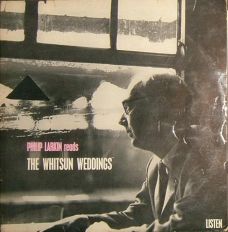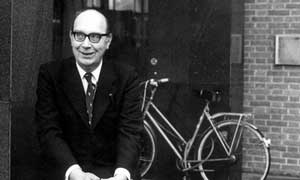After reading 13 of Larkin's poems in the volume, here is a summary of what we think so far. I've added my own ideas to yours. Please continue your own summary so far on your own blog:
Subject Matter
Contemporary
(60s) life – observations on mundane details of life and people-watching
Place - rooted in real locations which have significance for Larkin
Time
– Time slipping away. Element of regret
about life changing decisions – points at which life could change forever.
Youth - full of promise, hope and expectation for greatness
Expectations - can lead to disappointments, unfulfilment - looking back with perspective
Age
– he voices unsayable hatred of old age – perhaps shrouding fear of own ageing.
Death - inevitable, not to be feared
Change/Mutability
– England
Family - relationships, loss, love - parents seen from middle-age
Love, Marriage and/or Sex
– ability to see potential for greatness in marital union, but also base desire for sexual instinct to reproduce, difficulty of ultimate commitment - marriage a trap?
Life Choices - Fate
or free will? – are lives products of our existential choices or determined by
destiny, genes, our upbringing etc? Inevitability of age, regret etc.
Isolation - being an outsider, not conforming to the "norm"
Doubt - comparing self with others - who made the better life choices?
Hope
– that out of something ritualistic or stripped of meaning or seemingly
negative something good can come
Music/creative idols - passion for jazz - an escape, a "truth" in music. Timeless - triggers memories of younger selves
Attitudes expressed
Relationships,
marriage love – against them personally (?) - they hold you back/tie you down? but aware that they do suit some
people
Being
alone – not a bad thing, but offers possibilities for greater clarity
Accept life decisions made - no point in regretting
Other
people – rather negative and disparaging about their ignorance and lack of
vision
Dislikes
artificiality and falsity or show and pretence (modern life again) - a realist?
Against
organised religion – cynical.
Hope
expressed at end of poems – assertion of what’s good out of something which
initially seems negative/mundane to him
Philosophical - big ideas about human existence, reflective
Melancholy, pessimism (?) - glass half-empty?
Atheist/agnostic ? - but knowledgeable about faith and belief in others
Speaker
First
person (a persona not necessarily Larkin – make this clear)
An
onlooker – isolated from what he observes but able to see it more clearly
Disparaging
about those with “normal” lives
A
somewhat superior tone, sometimes angry or bitter (?)
 Sometimes compassionate
though and aware that other interpretations than his own have validity - he may be wrong
Sometimes compassionate
though and aware that other interpretations than his own have validity - he may be wrong
Reflective - introvert - nostalgic?
Structure of
poems
Initially:
Detailed concrete observation of everyday experience in often simpler language
Then:
Movement towards less concrete more abstract and metaphoric observations with
more overt judgements about what observing – more complex language
Finally:
A more expansive philosophical observation on some part of human existence –
usually
paradoxical in nature. An
epiphany at the end – a sudden realisation of
a grand thought. Often ambiguous language or open-ended.
Rhyme, rhythm , structure varied
from poem to poem – to suit individual poem’s ideas
Shows
flexibility and virtuosity of poet
Vocabulary
– wide and varied, carefully chosen for connotations but sometimes reproduces
colloquial, contemporary expressions.
Not specialist or archaic except for effect. Can be very erudite and learned - huge scope of cultural allusion/reference
Technically
very sophisticated:
Use
of sound effects for emphasis (of eg speed, heat): alliteration, assonance
Use
of connotative language
Use
of cumulative listing devices to suggest weariness,
Use
of compound adjective to collide ideas in efficient way
Use
of rhetorical cadences (eg groups of threes) to reach crescendo or diminuendo
Sparing
use of imagery when dealing with the abstract ideas reached by end of poem –
metaphor, simile, personification, anthropomorphization
Sophisticated
rhyming structures, but use of enjambment and caesura often hides them,
deflecting monotony and communicating rhythms of everyday speech
Use
of the conceit – metaphysical: a startling or unusual comparison which takes us
onto a completely different level of ideas
Use
of paradox and rhetorical devices which suggest paradox (oxymoron)
Use
of bathos – anticlimax to suggest mundanity or humour or condescension
Use
of pathetic fallacy – heat to suggest stifling repetition


